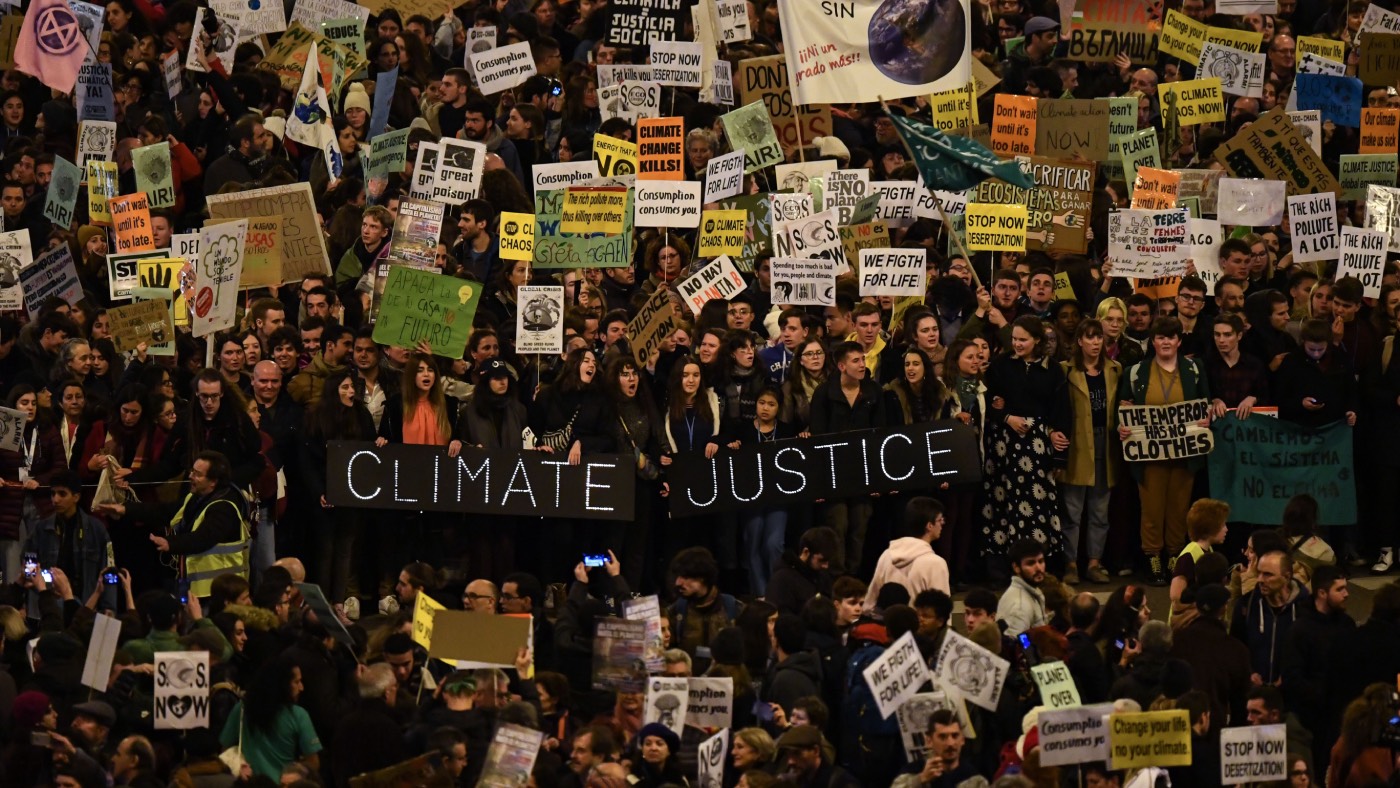Climate change talks end ‘with a whisper’
Disappointment as delegates agree compromise deal at Madrid conference

A free daily email with the biggest news stories of the day – and the best features from TheWeek.com
You are now subscribed
Your newsletter sign-up was successful
The latest United Nations climate talks have ended in Madrid with a compromise deal and widespread disappointment over the outcome.
The BBC says that “exhausted delegates” reached agreement on the key question of increasing the global response to curbing carbon. The agreement will see new, improved carbon cutting plans on the table by the time of the Glasgow conference next year.
However, this was not enough for many. The UN Secretary General Antonio Guterres said: “The international community lost an important opportunity to show increased ambition on mitigation, adaptation and finance to tackle the climate crisis.”
The Week
Escape your echo chamber. Get the facts behind the news, plus analysis from multiple perspectives.

Sign up for The Week's Free Newsletters
From our morning news briefing to a weekly Good News Newsletter, get the best of The Week delivered directly to your inbox.
From our morning news briefing to a weekly Good News Newsletter, get the best of The Week delivered directly to your inbox.
Laurence Tubiana from the European Climate Foundation, and an architect of the Paris agreement, described the outcome of the talks as “a far cry from what science tells us is needed”.
Discussions went at “snail’s pace”, The Guardian says, and had “low ambition”. This was a view shared by Oxfam International, whose interim executive director, Chema Vera, told CNN: “The world is screaming out for action but this summit responded with a whisper”.
May Boeve, executive director of climate campaign group 350.org, said the fossil fuel giants “got what they wanted - a weakened text that kicks most of the big issues down the road to COP26”.
Almost 200 countries met in Madrid for the talks, aimed at forging a new response to the climate crisis. The European Union and small island states pushed for more ambitious agreements but they were opposed by a range of larger nations including the US, Brazil, India and China.
A free daily email with the biggest news stories of the day – and the best features from TheWeek.com
Looking ahead, the BBC’s Roger Harrabin says the fact that next year’s climate conference will be held in Glasgow “heaps enormous pressure on UK Prime Minister Boris Johnson” because he could be “humiliated” if he tries to lead other nations while his own government is still failing to meet its own medium-term climate targets.
–––––––––––––––––––––––––––––––For a round-up of the most important stories from around the world - and a concise, refreshing and balanced take on the week’s news agenda - try The Week magazine. Start your trial subscription today –––––––––––––––––––––––––––––––
-
 The Olympic timekeepers keeping the Games on track
The Olympic timekeepers keeping the Games on trackUnder the Radar Swiss watchmaking giant Omega has been at the finish line of every Olympic Games for nearly 100 years
-
 Will increasing tensions with Iran boil over into war?
Will increasing tensions with Iran boil over into war?Today’s Big Question President Donald Trump has recently been threatening the country
-
 Corruption: The spy sheikh and the president
Corruption: The spy sheikh and the presidentFeature Trump is at the center of another scandal
-
 The plan to wall off the ‘Doomsday’ glacier
The plan to wall off the ‘Doomsday’ glacierUnder the Radar Massive barrier could ‘slow the rate of ice loss’ from Thwaites Glacier, whose total collapse would have devastating consequences
-
 Can the UK take any more rain?
Can the UK take any more rain?Today’s Big Question An Atlantic jet stream is ‘stuck’ over British skies, leading to ‘biblical’ downpours and more than 40 consecutive days of rain in some areas
-
 As temperatures rise, US incomes fall
As temperatures rise, US incomes fallUnder the radar Elevated temperatures are capable of affecting the entire economy
-
 The world is entering an ‘era of water bankruptcy’
The world is entering an ‘era of water bankruptcy’The explainer Water might soon be more valuable than gold
-
 Climate change could lead to a reptile ‘sexpocalypse’
Climate change could lead to a reptile ‘sexpocalypse’Under the radar The gender gap has hit the animal kingdom
-
 The former largest iceberg is turning blue. It’s a bad sign.
The former largest iceberg is turning blue. It’s a bad sign.Under the radar It is quickly melting away
-
 How drones detected a deadly threat to Arctic whales
How drones detected a deadly threat to Arctic whalesUnder the radar Monitoring the sea in the air
-
 ‘Jumping genes’: how polar bears are rewiring their DNA to survive the warming Arctic
‘Jumping genes’: how polar bears are rewiring their DNA to survive the warming ArcticUnder the radar The species is adapting to warmer temperatures